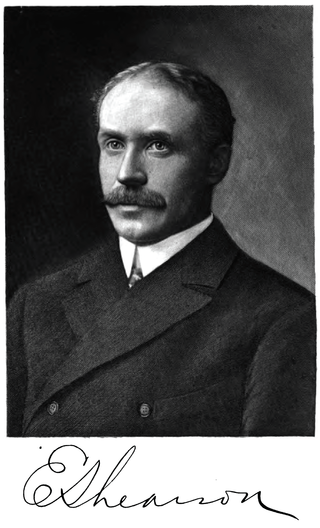EF Hutton was an American stock brokerage firm founded in 1904 by Edward Francis Hutton and his brother, Franklyn Laws Hutton. Later, it was led by well known Wall Street trader Gerald M. Loeb. Under their leadership, EF Hutton became one of the most respected financial firms in the United States and for several decades was the second largest brokerage firm in the country.

Sanford I. "Sandy" Weill is an American banker, financier and philanthropist. He is a former chief executive and chairman of Citigroup. He served in those positions from 1998 until October 1, 2003, and April 18, 2006, respectively.
Morgan Stanley Wealth Management is an American multinational financial services corporation specializing in retail brokerage. It is the wealth & asset management division of Morgan Stanley. On January 13, 2009, Morgan Stanley and Citigroup announced that Citigroup would sell 51% of Smith Barney to Morgan Stanley, creating Morgan Stanley Smith Barney, which was formerly a division of Citi Global Wealth Management. The combined brokerage house has 17,646 financial advisors and manages $2 trillion in client assets. Clients range from individual investors to small- and mid-sized businesses, as well as large corporations, non-profit organizations and family foundations.

Arthur Levitt Jr. is the former Chairman of the United States Securities and Exchange Commission (SEC). He served from 1993 to 2001 as the twenty-fifth and longest-serving chairman of the commission. Widely hailed as a champion of the individual investor, he has been criticized for not pushing for tougher accounting rules. Since May 2001 he has been employed as a senior adviser at the Carlyle Group. Levitt previously served as a policy advisor to Goldman Sachs and is a Director of Bloomberg LP, parent of Bloomberg News.
Roger Stuart Berlind was a New York City theatrical producer and board member of Lehman Brothers Holdings, Inc. and Lehman Brothers Inc. He was one of the founders of Carter, Berlind, Potoma & Weill in 1960, a company that would later through Sandy Weill become Shearson Loeb Rhoades, which was eventually sold to American Express in 1981 for approximately $930 million in stock.
Kuhn, Loeb & Co. was an American multinational investment bank founded in 1867 by Abraham Kuhn and his brother-in-law Solomon Loeb. Under the leadership of Jacob H. Schiff, Loeb's son-in-law, it grew to be one of the most influential investment banks in the late 19th and early 20th centuries, financing America's expanding railways and growth companies, including Western Union and Westinghouse, and thereby becoming the principal rival of J.P. Morgan & Co.

StoneX Group Inc. is an American financial services company. The company operates in six areas: commercial hedging, global payments, securities, physical commodities, foreign exchange and clearing and execution services (CES).

Commodities Corporation was a financial services company, based in Princeton, New Jersey, that traded actively across various commodities. The firm was noted as one of the leading commodity and futures trading firms. CC is credited for launching the careers of many notable hedge fund investors and for its influence on global macro investing.

Richard Davoud Donchian was an American commodities and futures trader, and a pioneer in the field of managed futures.

Shearson was the name of a series of investment banking and retail brokerage firms from 1902 until 1994, named for Edward Shearson and the firm he founded, Shearson Hammill & Co. Among Shearson's most notable incarnations were Shearson / American Express, Shearson Lehman / American Express, Shearson Lehman Brothers, Shearson Lehman Hutton and finally Smith Barney Shearson.

Shearson, Hammill & Co. was a Wall Street brokerage and investment banking firm founded in 1902 by Edward Shearson and Caleb Wild Hammill. The firm originally built its business as a stock broker as well as a broker of various commodities, particularly grain and cotton. The firm was a member of the New York Stock Exchange, the Chicago Stock Exchange and the Chicago Mercantile Exchange.
Loeb, Rhoades & Co. was a Wall Street brokerage firm founded in 1931 and acquired in 1979 by Sanford I. Weill's Shearson Hayden Stone. Although the firm would operate as Shearson Loeb Rhoades for two years, the firm would ultimately be acquired in 1981 by American Express to form Shearson/American Express and three years later Shearson Lehman/American Express.
Cogan, Berlind, Weill & Levitt, originally Carter, Berlind, Potoma & Weill, was an American investment banking and brokerage firm founded in 1960 and acquired by American Express in 1981. In its two decades as an independent firm, Cogan, Berlind, Weill & Levitt served as a vehicle for the rollup of more than a dozen brokerage and securities firms led by Sanford I. Weill that culminated in the formation of Shearson Loeb Rhoades.
Shearson was a well-known brand in the financial services industry from 1901 through 1993, related to the following:

Edward Shearson was a banker, millionaire and founder of Shearson, Hammill & Co., which was among the largest brokerage and investment banking firms in the United States.
Hornblower & Weeks was an investment banking and brokerage firm founded by Henry Hornblower and John W. Weeks in 1888. At its peak in the late 1970s, Hornblower ranked eighth among member firms of the New York Stock Exchange in number of retail offices, with 93 retail sales offices located in the United States and Europe.
Peter A. Cohen is the chairman and CEO of Andover National Corporation, a public holding company. He was formerly the chairman and CEO of Cowen Inc., also known as Cowen & Company now TD Cowen. Prior to his current role, Cohen founded Ramius Capital Management in 1994, a $13 billion investment firm, which he merged with Cowen Inc. in 2009. Prior to this, Cohen was the chairman and chief executive officer of Shearson Lehman American Express from 1983 through 1991.

Joseph J. Plumeri II is vice chairman of the First Data Board of Directors. He was the chairman and CEO of Willis Group Holdings (Willis), a New York Stock Exchange-listed insurance broker, until July 2013. The company has 17,000 employees in 400 offices, located in 120 countries. As of June 2010, Willis had the third-highest insurance brokerage revenues in the world.
Marshall S. Cogan is an American investor and entrepreneur and former financier and trader. Cogan was the founder of United Automotive Group, which he built into one of the largest retailers of cars and trucks in the U.S. As a private equity investor, Cogan acquired a number of businesses in the 1970s and 1980s. He was also a partner of Cogan, Berlind, Weill & Levitt an investment banking and brokerage firm that would be instrumental in the consolidation of the financial services industry in the 1970s.

John Langeloth Loeb Sr. was an American investor and executive who served as president of Loeb, Rhoades & Company.










